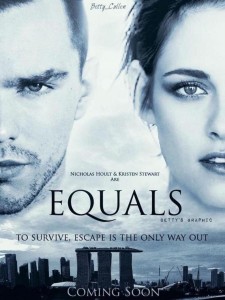
I would all like you to give another warm welcome to my guest here at CRR's!
Maria is a writer interested in comic books, cycling, and horror films. Her hobbies include cooking, doodling, and finding local shops around the city. She currently lives in Chicago with her two pet turtles, Franklin and Roy.
******
Equals: A New Type of Sci-Fi?
Equals is the newest cinematic offering from A24 Films and DirecTV that focuses on a
star-crossed romance within a utopian society. The world we are exposed to
throughout Equals’ is intended to show how an ideal society can be
created, as well as the logistical flaws involved in such an endeavor. Equals
comes across as a film that does its best to develop a unique identity,
separate from other recent dystopian youth films like The Hunger Games
and Divergent.
Director Drake Doremus and writer Nathan Parker have created
the utopian world of Equals, in which a near-futuristic society
reminiscent of The Giver has chemically neutralized emotions in all its
citizens. This is referred to as the “Switch On Syndrome” or SOS and anyone
showing any form of emotion is shipped off to the Defective Emotional
Neuropathy (DEN) center. Lead characters, Silas (Nicholas Hoult) and Nia (Kristen Stewart), meet each other at
the DEN center after Silas first manifests SOS. Silas senses a common bond in
Nia, who seems to suffer from emotion but is skilled at concealing it.
Casting Stewart in this role seems to fit with the common
perception that she has trouble emoting. Her style of acting, coupled with a
muted color palette to her wardrobe only helps to emphasize Nia's emotional
strain. Although Nia knows that society wants to purge her of her emotions,
she's unsure as to why. After Silas and Nia interact with a support
group, Jacki Weaver's Bess,
another SOS "victim," offers a chance at escaping. Bess states that
she once had an encounter with a man who offered her a chance to go to
"The Peninsula," a land of total freedom. She turned him down and
believes that the man's life was ended.
One quirk of this futuristic world is that any the intrusive
eye of big government seems to have cataracts as Nia and Silas rebel with
little punishment or obstruction. This may cause some to wonder why such an
oppressive system would have so few people leaving the community if it seems
like such an optional way of living. For all of Equals' interesting
world-building, it only feels like the audience gets the briefest overview of
each set piece and element as if large chunks of notes were left within the
script's margins. One shining element of this film is that even when Parker's'
script fails to make logical sense, it seems to strike hard and effectively at
the one thing the audience is told the film's society purges itself of: Emotion.
John Guleserian’s
cinematographic focus on a muted, steel-gray color palette and close-up shots
helps to bring the audience in touch with the emotional weight of Silas, Nia
and their struggles. This is especially poignant during the pair's first
attempt at intimacy where Nia finds herself struggling to communicate her
thoughts and simply begs Silas to take everything from her as if such an intense
emotional surge were best handled like a hot potato.
The film's final set piece may remind some of a
Shakespearean drama, in a positive way. The story of Equals is divvied
up among several small, emotive segments that ratchet up to an overwhelming
finale. The taste that this finale leaves in each viewer's mouth may vary from
person to person. In summation, Equals is a science-fiction film that
presents a world that tries to survive without emotion. The combination of
Drake Doremus and Nathan Parker, as director and scriptwriter respectively, and
Kristen Stewart's acting prowess helps to drive home the importance of emotion
in any society.


3 comments:
So...Equilibrium...
Yes! Sounds like a mixture of Equilibrium and Upside Down.
I don't know, I have a big problem with this actress....
Post a Comment